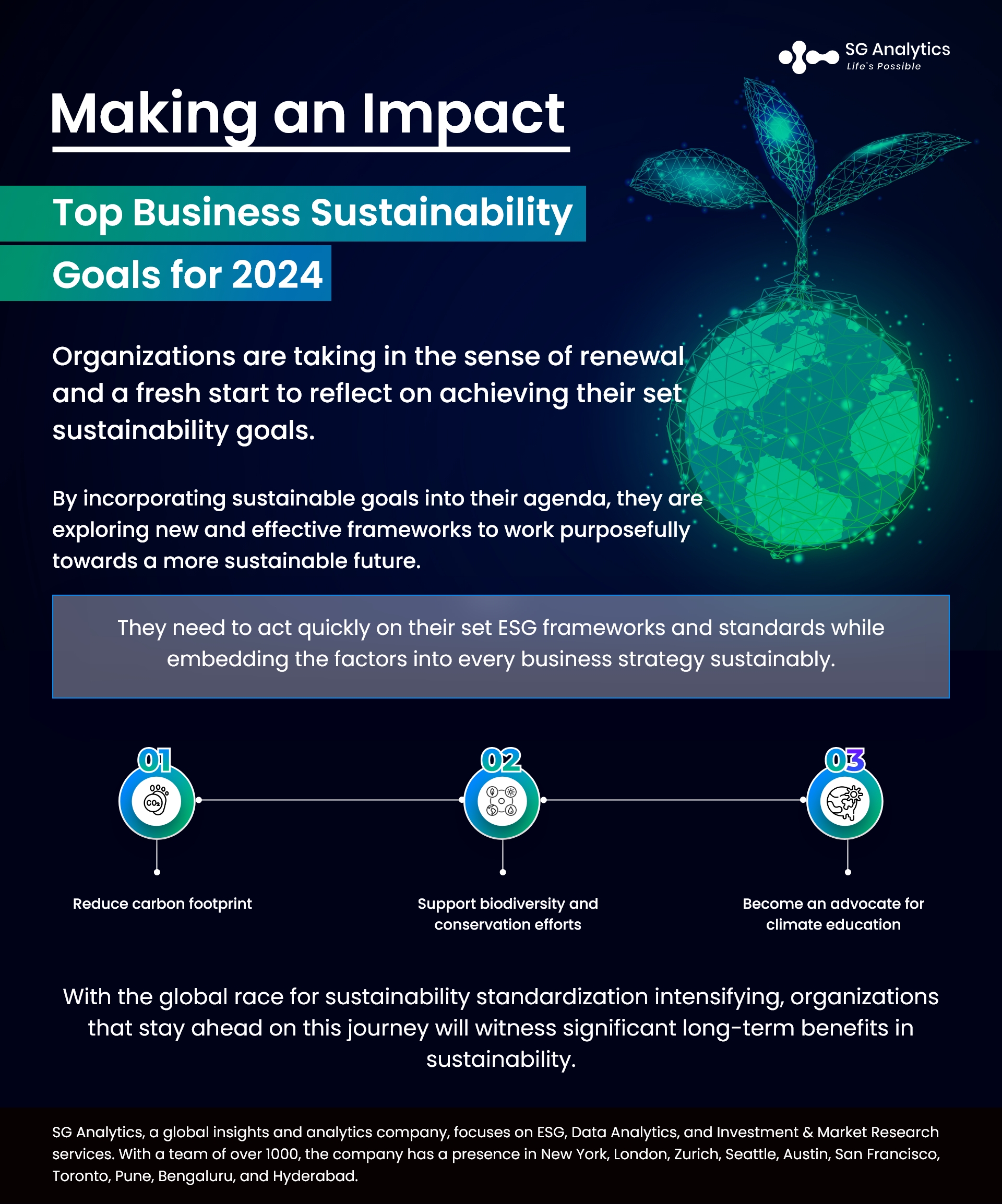Environmental, social, and governance (ESG) policies and standard regulations are becoming a dominant force for organizations and the way they operate and function. Understanding the tons of disparate data available to organizations is the biggest challenge, regardless of where they lie on the sustainability preparedness spectrum.
As sustainability is being morphed from carbon emissions tracking into company-wide commitments to achieve set global imperatives, organizations are finding themselves in the business of building a healthier world.
In 2025, environmental sustainability will be forced into the spotlight as organizations gear up to drive further change. The year will witness many events with implications for the environment, biodiversity, and global sustainability. From advancing sustainable management to fostering inclusive collaboration for biodiversity, organizations will work to support innovation and partnerships for people and the planet.
Reaching net-zero emissions in 2050 is emerging as a significant imperative for businesses to preserve a sustainable future for generations to come. But change needs to happen today to achieve that goal. It is time for organizations to integrate a reimagined approach that highlights the importance of steering away from long-term commitments and embracing tangible actions to make a positive impact. This is what the planet needs in 2025.
Read more: Climate Disclosure Legislation to Drive Businesses into a New Era of ESG Investment
Ways to Make a Significant Impact
The sustainability goal for 2024 is not just about committing to distant aspirations but about taking decisive actions and executing projects that deliver immediate economic and environmental impact. By prioritizing short-term goals with measurable outcomes, organizations can acknowledge the urgency of the environmental crisis and work towards delivering on the need for tangible progress.

Sustainability goals are driven by top-level priorities like energy cost savings, energy security, and decarbonization. However, planning for sustainable energy infrastructure is far from a one-size-fits-all process. It is based on an organization’s goals, preferences, values, and geographic location.
- Energy efficiency solutions are an effective strategy to achieve short-term sustainable goals. They help yield immediate results after implementation.
- Infrastructure upgrades also help in strategically reducing energy usage, thereby enabling companies to contribute to their environmental objectives and realize significant cost savings.
- Lowered energy costs help free up funds for reinvestment in different sustainability initiatives or key areas within the organization.
- Energy-efficient infrastructure helps in reducing consumption and has a measurable impact on the bottom line and the goal of decarbonization.
Adopting sustainability as a core principle of an organization and evaluating areas for energy and emissions improvement within the current operational structure will further equip organizations to set measurable, achievable, relevant, and time-bound goals. By narrowing down on prioritized areas, organizations can further establish a framework to achieve their sustainability goals, both in the short and long term.
Read more: ESG in 2024: Climate Adaptation Strategies and Predictions
Understanding and implementing sustainability goals in 2024 is not just a matter of compliance for organizations. It has become a crucial step for maintaining a competitive edge. With an evolving regulatory landscape of ESG policies, organizations adopt new trends to enhance their brand reputation and tap into new markets. Early adopters of ESG practices are likely to benefit from improved forecast accuracy and reduced controversies.
From carbon emissions to climate anxiety, every area of sustainability and climate change demands unique attention. While these are not one-size-fits-all concepts, organizations need to strive to be more sustainable. Let’s explore some of the areas that organizations need to consider working on in 2024:

- Reducing the carbon footprint: Carbon literacy training offers an understanding of how and why carbon emissions contribute to climate change. Reducing the carbon footprint presents a great way to incorporate sustainability organization operations. By making more sustainable choices in transportation and energy consumption, organizations can collectively make a big difference.
- Supporting biodiversity and conservation efforts: It is time for organizations to cultivate habits to support biodiversity conservation. This can be achieved by introducing significant initiatives like local tree planting or advocating for policies that protect natural habitats.
- Becoming an advocate for climate education: promoting and advocating climate education is the first step to driving change. Organizations need to inspire and empower their employees and others to become advocates for climate education. Whether it’s through social media, community events, or personal conversations, this will help in sharing more information about climate change and its impacts.
Today, it has become imperative for organizations to work towards nurturing a sustainable future. By committing to a set vision, taking decisive action, and executing projects that offer immediate economic and environmental impact, organizations can fulfill their set sustainability goals. When setting sustainability goals, it is important to be aware of areas that organizations need to work on.
Read more: Navigating the Responsible ESG Marketing Landscape
Setting Long-Term vs. Short-Term Goals
Through regulatory pressures and increased awareness of climate issues, the past decade has witnessed organizations across the globe adopting green-forward initiatives to prioritize sustainability and environmental responsibility. However, many did so by setting their focus on the distant future and aiming for ambitious goals for 2050. While these aspirations present a solid commitment to climate action, many organizations did not have a credible roadmap for implementation. This led to a disconnect between aspirations and tangible results. While many faced waves of backlash, others had to downplay their environmental initiatives and avoid potential criticism.
It is, therefore, important for organizations to commit to their own respective sustainability journeys. They should explore ways to meaningfully shift from distant sustainability goals and set more immediate and impactful initiatives. Organizations also need to scale back their sustainability goals as more and more consumers are pioneering environmental stewardship and setting the standard for other organizations and businesses to follow.
By prioritizing short-term goals with measurable outcomes, they can acknowledge the urgency of the environmental crisis and deliver results based on tangible progress. With a new vision that focuses less on aspirational climate commitments and more on immediate initiatives, organizations can make a stronger impact soon.
Read more: The Intersection of Technology and Sustainability to Overcome the ESG Dilemma

Navigating the 2025 Sustainability Landscape
With the sustainability landscape evolving rapidly, organizations and investors are increasingly recognizing the urgency of addressing climate change and the growing need to integrate sustainability measures as their corporate responsibility for long-term success and resilience. In 2024, organizations are taking in the sense of renewal and a fresh start to reflect on achieving their set sustainability goals. By incorporating sustainable goals into their agenda, they are exploring new and effective frameworks to work purposefully towards a more sustainable 2024.
The year 2024 is set to bring a new year full of possibilities and opportunities. While the persistent threat of climate change remains, corporations are finding themselves at the forefront of implementing meaningful change to help make significant strides. This ever-increasing urgency of the climate crisis is compelling them to reevaluate their current sustainability commitments and recognize the growing need for immediate and impactful actions.
Organizations need to establish data transparency with detailed precision in their entire value chain. They need to act quickly on their set ESG frameworks and standards while embedding the factors sustainably into every business strategy. Today, customers are replacing time-consuming and inaccurate approaches with holistic steering and reporting solutions. This further enables businesses to simplify data visibility, enabling them to record, report, and act on quality data across the value chain.
With the global race for sustainability standardization intensifying, organizations that stay ahead on this journey will witness significant long-term benefits in sustainability.
SG Analytics, recognized by the Financial Times as one of APAC’s fastest-growing firms, is a prominent insights and analytics company specializing in data-centric research and contextual analytics. Operating globally across the US, UK, Poland, Switzerland, and India, we expertly guide data from inception to transform it into invaluable insights using our knowledge-driven ecosystem, results-focused solutions, and advanced technology platform. Our distinguished clientele, including Fortune 500 giants, attests to our mastery of harnessing data with purpose, merging content and context to overcome business challenges. With our Brand Promise of “Life’s Possible,” we consistently deliver enduring value, ensuring the utmost client delight.
A leader in ESG Services, SG Analytics offers bespoke sustainability consulting services and research support for informed decision-making. Contact us today if you are in search of an efficient ESG (Environmental, Social, and Governance) integration and management solution provider to boost your sustainable performance.
About SG Analytics
SG Analytics is an industry-leading global insights and analytics firm providing data-centric research and contextual analytics services to its clients, including Fortune 500 companies, across BFSI, Technology, Media & Entertainment, and Healthcare sectors. Established in 2007, SG Analytics is a Great Place to Work® (GPTW) certified company and has a team of over 1100 employees and has presence across the U.S.A, the U.K., Switzerland, Canada, and India.
Apart from being recognized by reputed firms such as Analytics India Magazine, Everest Group, and ISG, SG Analytics has been recently awarded as the top ESG consultancy of the year 2022 and Idea Awards 2023 by Entrepreneur India in the “Best Use of Data” category.

